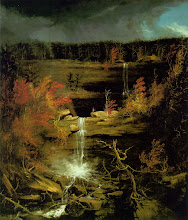Summary:
Chytry describes how Marx, using his Classical background and Hegelian structures, claims that labor unifies the mind and body as well as the public and private worlds of individuals. However, modern capitalism, with its pursuit of profit and technological advances, alienates man from the whole process of production by devaluing his time and by developing a division of labor. To transform society would take a revolution, but the new society would result in the "'cultivation of the five senses'" and the "flowering of a 'humane' sensibility."
Questions:
In what ways have we come back to the beginnings (Greco-Roman)?
Does this mean that in order for labor to be aesthetic there must be a physical product?
If we end with "sensibility," does this mean Marx has reversed the order of aesthetic ideas? It seems that prior readings started with senses.
Why was Germany such a hub of philosophical ideas?
Values:
Whole better than parts.
New values:
Aesthetics no longer tied to upper classes with "taste."
Links: Marx predates the ashcan school (Robert Henri, John Sloan, et al), but I can see his influence on their work.
Subscribe to:
Post Comments (Atom)
.jpg)
.jpg)
.jpg)
No comments:
Post a Comment